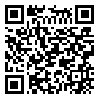BibTeX | RIS | EndNote | Medlars | ProCite | Reference Manager | RefWorks
Send citation to:
URL: http://tumj.tums.ac.ir/article-1-338-en.html

 , Etebary S
, Etebary S 
 , Sadeghipour Roodsari HR *
, Sadeghipour Roodsari HR * 
 1, Zarrindast MR
1, Zarrindast MR 
 , Karimian SM
, Karimian SM 
 , Nabavi Zadeh F
, Nabavi Zadeh F 

Background: Postpartum depression is a mood disorder that has harmful effects on mothers, infants, family and relationships. Acute decrease of progesterone after delivery has been proposed as a cause for postpartum depression. This hormone can affect neurotransmitters' function. Zinc (Zn) and magnesium (Mg) as trace elements exert their antidepressant effects through neurotransmitter pathways. On the other hand, thiamin (Vit B1) deficiency leads to depression in animal models. The aim of this study was to evaluate effects of combination of zinc, magnesium and thiamine on postpartum depression and role of nitrergic system.
Methods: One hundred ten female mice in five groups were used. Postpartum depression was conducted using progesterone injections. Combinations of Zinc chloride, magnesium chloride and thiamine HCL were administered 30 minutes before open field and forced swimming test (FST). In order to investigate role of nitrergic system, L-arginine and LNAME were administered.Results: All treatment groups spent less immobility time than the control group (p< 0.05). Combined administration of Zn+ Mg+ Vit B1 caused the most reduction in immobility time. Administration of L-NAME in Zn+ Mg+ Vit B1 group caused reduction in immobility time while administration of L-arginine caused increase in immobility time in the same group.
Conclusion: Zinc, magnesium and thiamine can improve depressive symptoms by nitrergic pathway. These elements as supplement compounds could be alternatives for antidepressants in postpartum period.
| Rights and permissions | |
 |
This work is licensed under a Creative Commons Attribution-NonCommercial 4.0 International License. |



